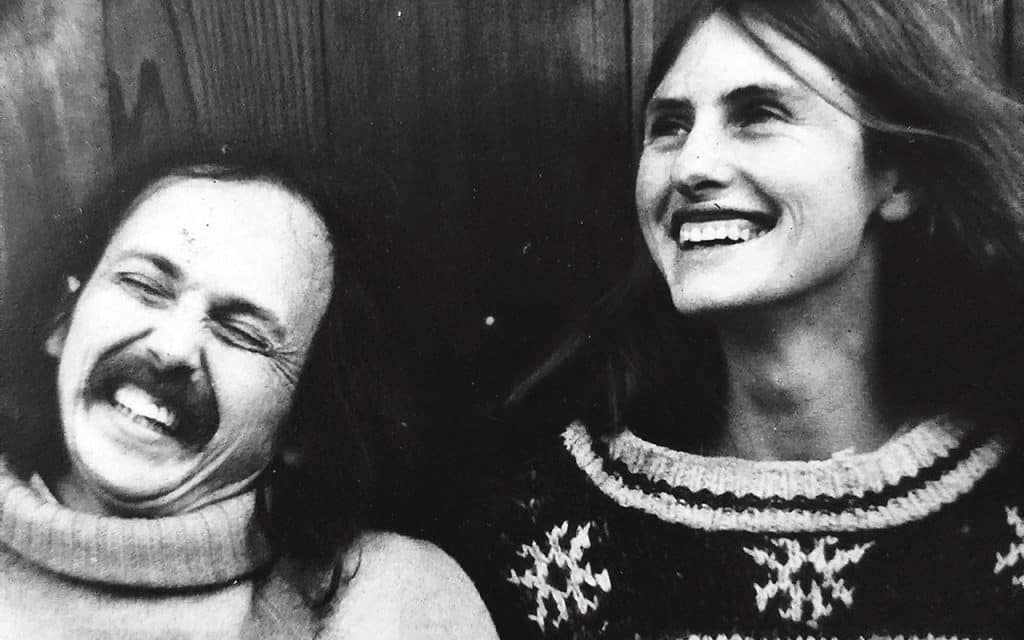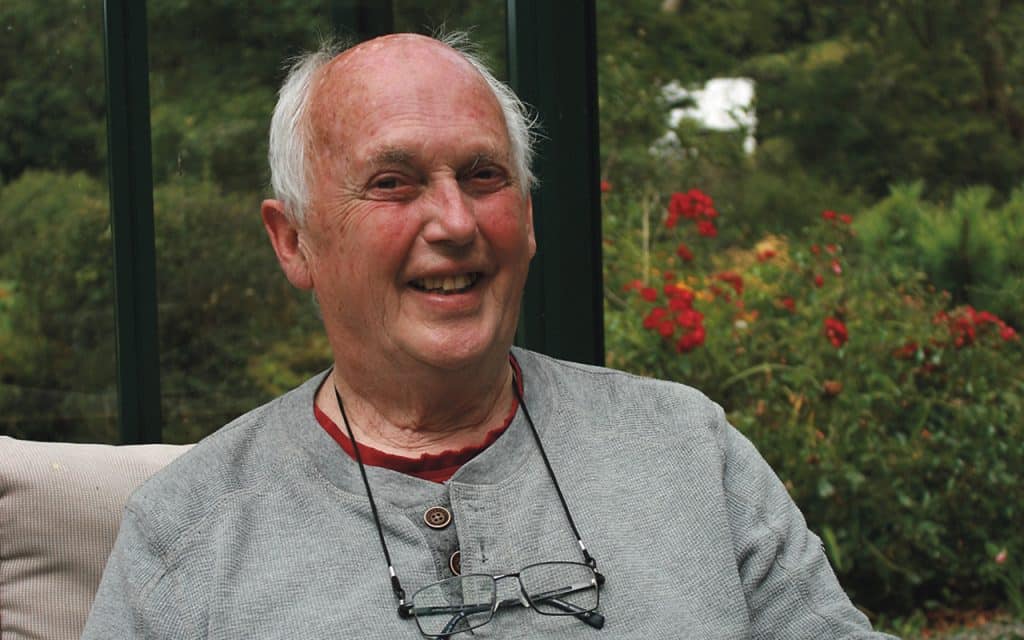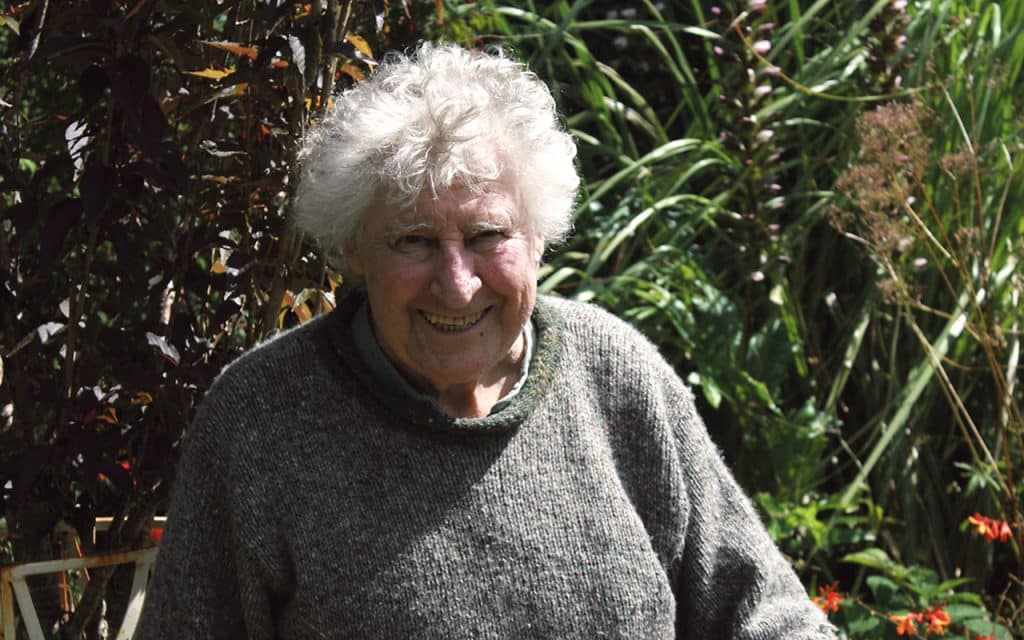As a self-confessed lifetime hippie and pacifist, Bill Chase has always embraced love, peace and nature. The only son of Irish Catholic parents, Bill reached his teenage years on the cusp of the counterculture of 1960s America, a period defined by the Vietnam War and Civil Rights Movement. He chose the hippie rather than political trail he tells Mary O’Brien, which brought him to California and on to Mexico, where he met and fell in love with his future Australian wife Rain. The couple, who have been together over fifty years – marrying in a silent ceremony in the Universal Life Church on top of a mountain in California in the 70s – and have three children together, settled in West Cork in the early 80s, where Bill became a humanist celebrant for a time, and they set up one of Ireland’s most successful garden centres, which is still in the family 40 years later.


In his quest for identity In his younger years, Bill naively labelled himself a communist – “although I really had no idea what that meant at the time” – tried (unsuccessfully) to get to Cuba – “to be a part of the action” – sampled psychotherapy and psychedelics and after experiencing San Francisco’s ‘Human Be-in’, an event promoting peace, love and music he organised the first ‘Be-in’ event in New York, marking the end of his relationship with the city.
Bill dropped out of college six weeks before earning his masters degree in psychology.
“The combined influences of drugs and therapy inevitably forced me to ask myself the classic question: What was I was doing with my life?” he shares.
At a loose end, Bill left New York for California, where he spent the summer of 67 at the home of Cass Elliot of the Mamas and the Papas watching his music records come to life, hanging out with the likes of The Byrds, The Monkeys and David Crosby. “It was fun and I started taking things for granted but inevitably my days as an uninvited houseguest came to end and I realised it was time to move on,” he shares.
After dodging the draft during the Vietnam War by getting a psychologist friend to write a letter stating he was ‘a depressive schizophrenic homosexual’, Bill continued travelling, blowing all the money left in the trust fund bequeathed to him by his late parents on a piece of land he named ‘Rivendell’ in Albion on the northern Californian coast. Settling there with a woman called Diane, the couple were soon joined by likeminded others, and ‘Rivendell’ became a hippie commune.
“Life became quite pastoral,” shares Bill “and we began to learn a new set of skills – chopping and stacking firewood, sowing seeds, milking goats. Bill and Diane’s son, Noah, – Bill later named another son ‘Noah’ – was born into this self-sufficient communal lifestyle.
When the relationship with Diane ended – after she met “an intense Israeli called Bert” – Bill decided to travel to Mexico, where he met the love of his life, Susan Jane, better known as Rain.
“Although she didn’t say much, I couldn’t stop looking at her” says Bill nostalgically. “I was obsessed from the moment I spotted her in the back of a VW.”
Bill and Rain moved to Rivendell, got married and had a son called Albion, and life carried on, with Diane, Bert and Noah also under the same roof.
It was around this time that Bill embraced rational thinking. “Lots of religious types popped up at Rivendell,” he says. “Buddhists, Sufis, Hare Krishnas, and of course Christians…all maintaining that they had found the true path and trying to convince us to join them.”
Bill however found himself more drawn to the teachings of psychologist Robert A Wilson who wrote that “Belief is the death of intelligence”.
After Diane and Bert moved to Israel with Noah, Bill and Rain spent the next few years travelling with their son, stopping off briefly in Seattle and spending some tough winters in Washington State.
Then Bill received a letter from Diane asking him to cease communication with his son, Noah, as she wanted their child to know Bert as his ‘real’ father. Bill made the difficult decision to comply with her request, and although he and ‘Noah’ reconnected in later years – Noah went on to become a musician in a Jewish rock band and is now living in the States – it was a decision that still causes him great regret.
Now into the late-1970s, Bill and Rain decided to take their journey together across the Atlantic, first to England, via Morocco, at the invitation of Rain’s parents who were holidaying there, before travelling on to Wales and finally joining another couple on a trip to Ireland.
The friends bought a van together – a green Bedford with just enough sleeping space for two people. “We would sleep inside the van one night, while the other couple slept under the stars and vice versa. It all worked out quite well…until it rained,” says Bill laughing.
So began Bill and Rain’s adventures in West Cork. “I had never felt such a pull to a people and place like this before….it felt like we were meant to be here,” admits Bill. “It was also the first time in my life I was ever seriously broke,” he adds.
After attempting to make a living from growing vegetables in Rosscarbery – “after a year my daily routine consisted of getting up at five every morning to bag up lettuce to bring to the supermarket in Skibbereen,” says Bill – they eventually did get some things right and started to earn a modest income. Their second child, Noah, was also born.
Life was busy and challenging for the young family so when the opportunity arose to sell their home in Rosscarbery, they jumped at it, purchasing 40 acres of beautiful – but what they soon learned was unfortunately unproductive – land in Glengarriff.
After a period of extreme hardship, Bill and Rain played with the idea of moving to Tasmania with some friends. “We put the land in Glengarriff up for sale and the next thing we knew the Hare Krishnas showed up,” says Bill. In a strange coincidence, it turned out that the head Hare and Bill knew each other from their days in Albion. “He was living in a teepee on the same road as our commune,” explains Bill. “We had a good laugh about it.”
The sale went through and, after ditching the idea of Tasmania in favour of going into business growing herbs and perennials with another couple, Rodger and Julia, the seeds of their future in the gardening industry were planted. They started selling plants to local garden centres from a van and took the opportunity to purchase Deelish in 1984 when it arose.
“The only element missing from our scheme was knowledge,” muses Bill, who shares how he would stay up late every night for two years devouring plant books. “It was the steepest learning curve I’ve ever been on in my life.”
Around this time, Bill developed a keen interest in environmental matters and joined Earthwatch. “Soon I was driving to the headquarters in Bantry several times each week, spewing diesel fumes over the countryside, as I attempted to save the world,” he says wryly.
In 1987, the couple celebrated the birth of their third child, Emma.
Raising a family and running a business during the eighties, a decade of recession, was tough going. “We’d operate in overdraft for ten months of the year, only crawling out of it very briefly every spring,” shares Bill.
They prevailed however and started to build a reputation throughout West Cork and Ireland for quality and great value plants. As well as supplying West Cork gardens, Deelish also started working with a number of garden owners and designers around Ireland.
Many of their plants ended up being planted in famous gardens throughout Ireland and Europe, including botanical gardens, and even Buckingham palace!
After studying horticulture in Australia and at the Eden project in Cornwall, their son Noah returned to Deelish in 2007, adding his expertise on rare plants and sustainable, chemical-free gardening to the business.
Bill and Rain passed on the mantle to Noah and his wife Maya in 2019, who continued to modernise and expand their legacy, making it one of Ireland’s top designations for plant lovers.
As a deep thinker, Bill, now 80, has spent his life pondering some of life’s bigger questions but in retirement he has given up hope of reaching any conclusions, except that every detail of life, from the minutiae to the fundamental, can all bring wonder in their own way: The self-taught botanist is as happy to talk in depth about the opening of a flower as he is to discuss a political ideology.
“I love retirement,” says Bill. “It turns out that one of my great skills is being able to stare at a wall for two hours and not get tired of it,” he adds laughing.



